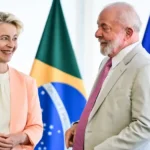
Recycling failure: CEO doubles down on loyalists to save Meta
In the corporate theater of Silicon Valley, few plays are as predictable as the “great restructuring” that follows an embarrassing failure. At Meta, Mark Zuckerberg’s empire, the curtain has barely closed on the metaverse fiasco and is already rising for a new act: the desperate race for artificial intelligence. And who stars in this new production? The same faces as always, in a game of musical chairs that signals less innovation and more the consolidation of the power of a cornered billionaire.
The appointment of Vishal Shah, one of Zuckerberg’s oldest and closest executives, to a strategic role in the AI division is the clearest symptom of this dynamic. Shah is not a disruptive new talent; he is the man who, since 2021, has led the ambitious, multibillion-dollar metaverse project – a project that, so far, has delivered little beyond legless avatars and colossal losses.
Now, the “loyal” Shah is repositioned to accelerate AI. The urgency has a name: Sora. Meta, in a hasty attempt to show service, launched its AI video service, Vibes. The launch was a stumble. Days later, OpenAI presented Sora, with videos of astonishing realism and fluidity, and Vibes was instantly relegated to technological oblivion. Meta has been overshadowed, looking like a company that plays not to lose rather than one that leads.
It is in this scenario of reaction, and not action, that restructuring takes place. The internal memo from Nat Friedman, head of the AI products division, is revealing: “We can’t just be an AI team, we need to be an AI company.” The phrase, which tries to sound like a war cry, sounds more like panic. Meta, a US$1.9 trillion giant, is playing catch-up.
And who is Nat Friedman, the new boss Shah will serve under? A former CEO of GitHub, investor and advisor to Zuckerberg since 2024, hired in June. His arrival was sealed with a uniquely lucrative deal: As part of his hiring, Meta acquired 49% of Friedman’s personal investment fund. A comfortable arrangement for the new executive.
The story of Vibes, in fact, reveals the complex web of interests that now dictates the direction of AI at Meta. Friedman, in his eagerness to launch the product before Sora, pushed for a long-term, billion-dollar deal with startup Midjourney. This startup provided the application’s base technology, supplanting the models that should have been developed internally by Meta. The crucial detail: Friedman was a former Midjourney advisor. The result was an initial boost in downloads, followed by immediate post-Sora irrelevance.
While insiders close billion-dollar and profitable deals, the bill for instability reaches the factory floor. Last week, ironically after months of “aggressive hiring” to bolster AI, Meta laid off around 600 industry employees. The official justification? Make decision-making processes “more agile”. In practice, workers are used as leverage for Zuckerberg’s strategic pivots. Hire aggressively, fire “agilely”.
Shah’s promotion, therefore, is not about bringing out the best in AI; it’s about Zuckerberg restoring order. After the underwhelming performance of the Llama 4 model and the disastrous debut of the Vibes, the CEO turns to those he trusts: his longtime allies. Shah, praised by Friedman for his “deep relationships within Meta,” is the right man to ensure that Zuckerberg’s vision is implemented without question.
And what is this vision? Integration. Shah won’t just handle AI on Instagram and WhatsApp; he will be the bridge between the “Superintelligence” laboratory and “Reality Labs” – what’s left of the metaverse. Meta is not abandoning its failed investment; is trying to revive him with the AI defibrillator. Shah talks about “shaping how we deliver personal superintelligence to billions of people across all devices.”
The truth is less grandiose. Zuckerberg is merging his two big bets, not because they are synergistic, but because he can’t allow either of them to fail completely. The appointment of Shah, the man from the metaverse, to lead AI integration is not a revolution. It is the retraining of executives, the reaffirmation of loyalty as the main criterion and proof that, at Meta, the priority is not genuine innovation, but the consolidation of the CEO’s control, whatever the cost – be it billions of dollars for friends or hundreds of jobs for employees.
Source: https://www.ocafezinho.com/2025/11/08/zuckerberg-tenta-reacender-o-brilho-da-meta-com-a-ia/

